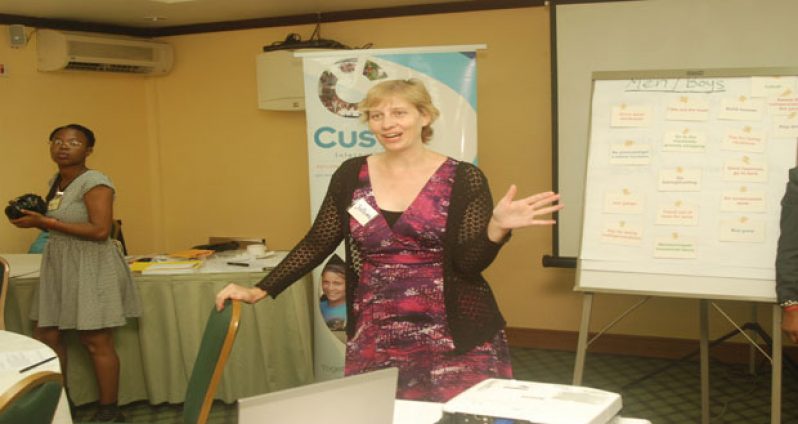A GENDER equality and mainstreaming training session held yesterday at Cara Lodge, Quamina Street, Georgetown, had lively discussions on gender verses sex, gender equality, gender-based violence and gender mainstreaming.
The session drew a broad spectrum of public, private sector, governmental and non-governmental organisations and institutions.
Jillian Hess, who is volunteering as the Canadian University Services Overseas (CUSO) Guyana Gender Specialist, facilitated the session yesterday morning, and it was well received during the interactive discussions.
GENDER INEQUALITY

Meanwhile, CUSO Guyana Country Representative, Melanie McTurk told the media that gender inequality is a challenge that we all share and gender mainstreaming is a goal to which our society and organisations should be aspiring.
She added that CUSO International is a development organisation that works to reduce poverty and inequality through the efforts of skilled volunteers.
McTurk stated that CUSO Guyana conducted research in 2013 in aid of garnering a deeper understanding of gender in Guyana and towards the creation of an action plan to guide their work locally.
She pointed out that in March 2014 at the celebrations to observe International Women’s Day the action plan was launched which addresses inequality between women and men.
McTurk said, “I want to shatter one pervasive myth, that is, when we talk about gender we are not speaking only about women but men also since society needs the contribution of both genders.”
She stated that despite strides in the advancement of the status of women both in Guyana and around the world, the most disadvantaged members of our society are more likely to be the victims of domestic violence and sexually-based violence, and are less likely to be represented in decisions that affect them.
McTurk said for a developing country like Guyana, especially one with a small population, the empowerment of women, especially the engagement of women and more over young women in paid employment and decision-making remains critical for one very simple reason – “we cannot afford not to, from a sheer issue of numbers.”
The workshop, McTurk added, is aimed at educating stakeholders so they have a heightened understanding of what gender is and the role it plays in Guyana in terms of the country’s development.
In the Caribbean both genders are doing very well, and in positions of authority more women are taking up that role while young men are more associated in crimes and more likely to drop out of school, she said.
McTurk told the media yesterday that in Guyana, according to research, domestic violence is one of our biggest problems, with direct implications for our economy; as people cannot go to work because they have physical injuries or they are prevented from working and so on.
More than 40 stakeholders were in attendance, drawn from a wide cross-section of organisations, including the Guyana Women Lawyers Association, the Guyana Police Force, SASOD, Legal Aid Clinic, National Council on Disability, Women Across Differences, Conversation International, Volunteer National Youth Council, Women Agro Processors Association, and Women’s Affairs Bureau.





.jpg)








